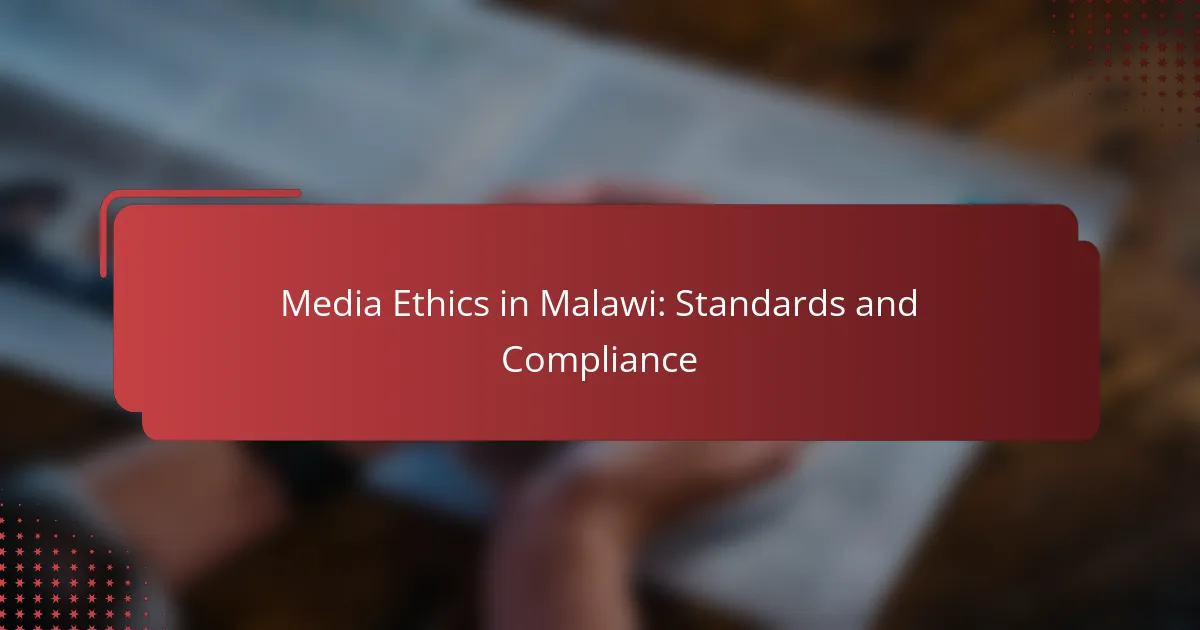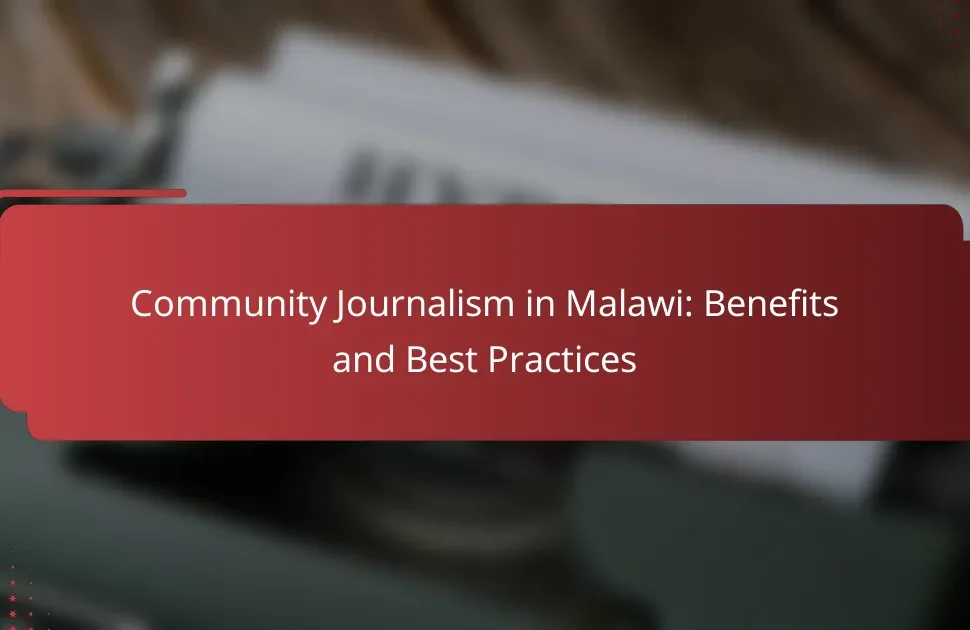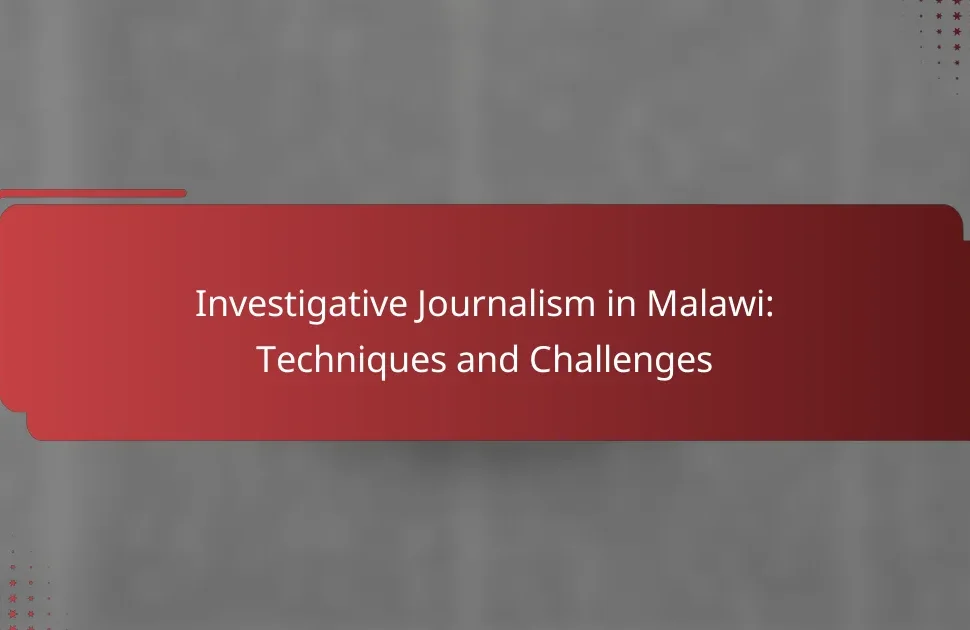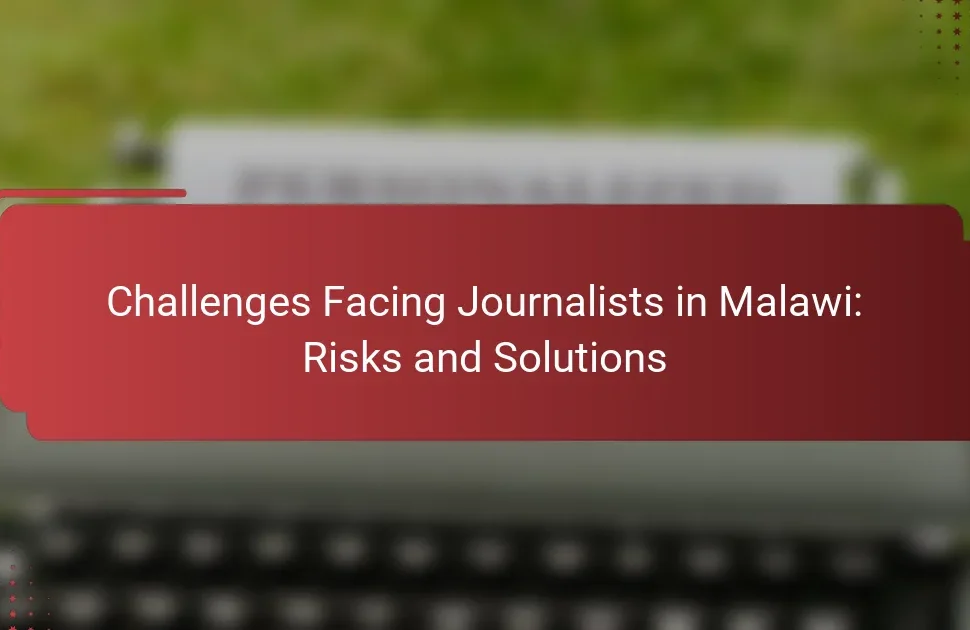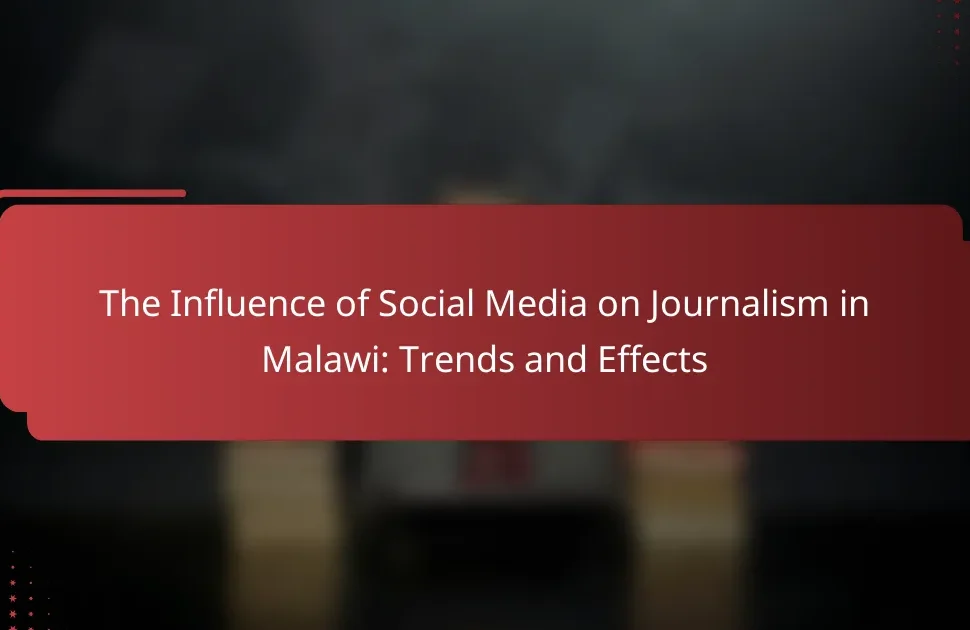Media ethics in Malawi are governed by key principles such as truthfulness, accuracy, fairness, and accountability, which are essential for maintaining public trust. The Malawi Communications Regulatory Authority (MACRA) and the Media Council of Malawi enforce these ethical standards, ensuring that journalists report facts without distortion and correct errors promptly. The Media Council’s Code of Ethics emphasizes responsible journalism, including respect for privacy and avoidance of sensationalism, while also promoting diversity and inclusion in media representation. Despite challenges like political interference and resource limitations, ongoing initiatives aim to strengthen adherence to these ethical standards within the Malawian media landscape.
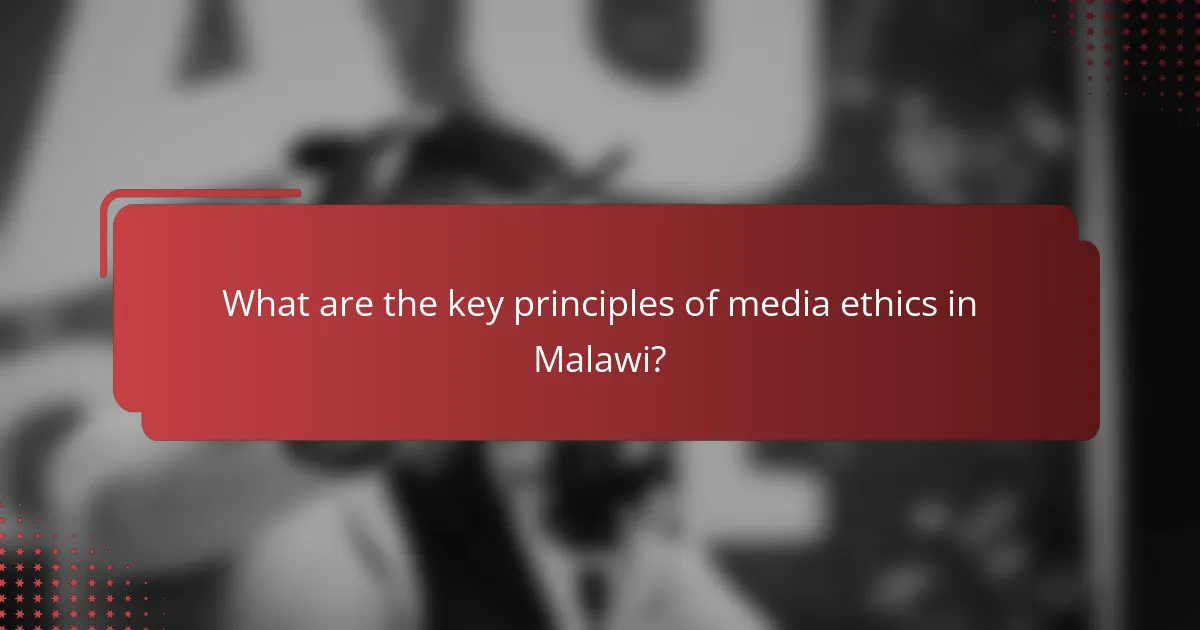
What are the key principles of media ethics in Malawi?
The key principles of media ethics in Malawi include truthfulness, accuracy, fairness, and accountability. Media practitioners are expected to report facts without distortion. They must ensure that information is verified before publication. Fairness involves representing all sides of a story. Accountability requires media outlets to correct errors promptly. These principles are crucial for maintaining public trust. The Malawi Communications Regulatory Authority enforces these ethical standards. Adhering to these principles supports a responsible media environment.
How do these principles influence media practices?
Media ethics principles significantly influence media practices in Malawi. These principles guide journalists in maintaining integrity, accountability, and fairness. They promote responsible reporting that respects individuals’ rights and societal norms. Adhering to these principles enhances public trust in media outlets. For instance, ethical guidelines discourage sensationalism and misinformation. This leads to more accurate news coverage. Furthermore, they establish standards for conflict of interest disclosures. Such practices ensure that media organizations operate transparently. Overall, these principles shape a media landscape that prioritizes ethical responsibility and public interest.
What are the implications of adhering to media ethics?
Adhering to media ethics fosters trust between media outlets and the public. It ensures accurate and fair reporting, which is crucial for informed citizenry. Ethical media practices promote accountability and transparency within the industry. They reduce the risk of misinformation and sensationalism, which can harm public discourse. In Malawi, adherence to media ethics can enhance the credibility of local journalism. This credibility is essential for democratic engagement and governance. Studies show that ethical journalism leads to higher audience trust and engagement. Ultimately, media ethics contribute to a healthier public sphere and informed society.
How do ethical principles guide journalists in Malawi?
Ethical principles guide journalists in Malawi by establishing standards for accuracy, fairness, and integrity. These principles promote responsible reporting and protect the public’s right to information. Journalists are expected to verify facts before publication to avoid spreading misinformation. They must also give balanced viewpoints to ensure fairness in their reporting. Additionally, ethical guidelines discourage conflicts of interest and promote transparency in sourcing. The Malawi Journalists Association provides a code of ethics that outlines these principles. Adhering to these guidelines fosters trust between the media and the public. This adherence is crucial in a country where media freedom is essential for democracy.
Why is compliance with media ethics important in Malawi?
Compliance with media ethics is crucial in Malawi to ensure responsible journalism. Ethical media practices protect the public from misinformation and uphold democratic values. They foster trust between the media and the community. In Malawi, where media plays a significant role in shaping public opinion, adherence to ethical standards is vital. Violations can lead to public distrust and social unrest. Furthermore, ethical compliance helps safeguard the rights of individuals and promotes accountability among journalists. According to the Malawi Communications Regulatory Authority, ethical media practices contribute to a more informed citizenry, supporting democratic governance.
What consequences arise from non-compliance with media ethics?
Non-compliance with media ethics can lead to severe consequences for media organizations and professionals. These consequences include loss of credibility and trust among audiences. When media outlets fail to adhere to ethical standards, they risk spreading misinformation. This can result in public confusion and harm to individuals or communities. Legal repercussions may also occur, including lawsuits or fines for defamation or invasion of privacy. Additionally, non-compliance can lead to professional sanctions, such as revocation of licenses or expulsion from professional organizations. Ultimately, these consequences can undermine the integrity of the media landscape and diminish its role in society.
How does compliance enhance public trust in media?
Compliance enhances public trust in media by ensuring adherence to ethical standards and regulations. When media organizations follow established guidelines, they demonstrate accountability and integrity. This practice fosters a sense of reliability among the audience. Trust increases when the public perceives that media outlets prioritize truthfulness and transparency. Research shows that ethical compliance leads to higher audience satisfaction and loyalty. For instance, a study by the Pew Research Center found that 75% of respondents trust news organizations that are transparent about their sources. Therefore, compliance is crucial for building and maintaining public trust in media.
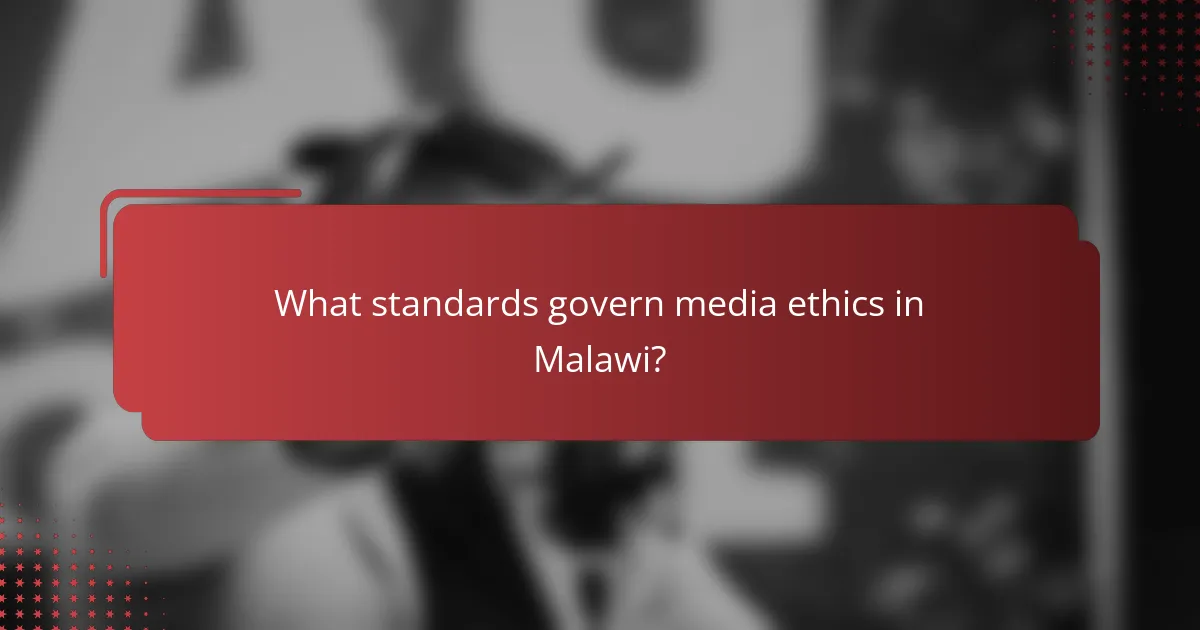
What standards govern media ethics in Malawi?
The standards that govern media ethics in Malawi include the Media Council of Malawi’s Code of Ethics. This code outlines principles for responsible journalism. It emphasizes accuracy, fairness, and accountability in reporting. Journalists are expected to respect privacy and avoid sensationalism. The code also encourages diversity and inclusion in media representation. Compliance with these standards is monitored by the Media Council. Violations can lead to sanctions or disciplinary actions against media practitioners. The existence of the code reflects Malawi’s commitment to ethical journalism.
Which organizations are responsible for establishing these standards?
The organizations responsible for establishing media ethics standards in Malawi include the Malawi Communications Regulatory Authority (MACRA) and the Media Council of Malawi. MACRA oversees broadcasting and telecommunications regulations. The Media Council of Malawi focuses on promoting ethical journalism standards. These organizations work together to ensure compliance with established media ethics. Their roles are crucial for maintaining integrity and accountability in the media sector.
What roles do regulatory bodies play in media ethics?
Regulatory bodies play a crucial role in media ethics by establishing guidelines and standards for media conduct. They oversee compliance with ethical practices in journalism and broadcasting. These bodies ensure accountability by monitoring media organizations and addressing violations. They also provide a framework for resolving disputes between media entities and the public. Additionally, regulatory bodies promote transparency and fairness in media reporting. They often engage in public awareness campaigns about media ethics. In Malawi, the Malawi Communications Regulatory Authority (MACRA) exemplifies such a body, enforcing ethical standards in the media landscape. Their efforts contribute to maintaining public trust in media institutions.
How do these organizations enforce compliance?
Organizations enforce compliance through a combination of regulations, monitoring, and penalties. They establish clear ethical guidelines that media outlets must follow. Regular audits and assessments are conducted to ensure adherence to these standards. Violations can lead to sanctions, including fines or revocation of licenses. Training programs are also implemented to educate media professionals about ethical practices. Collaboration with governmental and non-governmental bodies enhances enforcement efforts. Public accountability mechanisms allow citizens to report unethical behavior. These strategies collectively promote a culture of compliance within the media landscape in Malawi.
What are the specific ethical guidelines for journalists in Malawi?
Journalists in Malawi adhere to specific ethical guidelines that promote accuracy, fairness, and accountability. These guidelines emphasize the importance of truthfulness in reporting. Journalists are required to verify information before publication. They must respect the privacy of individuals and avoid sensationalism. Additionally, they should strive for impartiality and avoid conflicts of interest. The Malawi Communications Regulatory Authority oversees compliance with these ethical standards. Violations can lead to penalties or revocation of licenses. These guidelines are essential for maintaining public trust in the media.
How do these guidelines address issues of accuracy and fairness?
These guidelines address issues of accuracy and fairness by establishing clear standards for reporting. They require journalists to verify information before publication. This verification process includes cross-checking facts with credible sources. Additionally, the guidelines emphasize the importance of presenting multiple perspectives. This approach ensures balanced reporting and reduces bias. Fairness is further reinforced by the mandate to correct errors promptly. By adhering to these principles, media outlets uphold their responsibility to inform the public accurately. These practices contribute to greater trust in media institutions.
What measures are in place to protect sources and whistleblowers?
In Malawi, measures to protect sources and whistleblowers include legal protections and confidentiality agreements. The Whistleblower Protection Act provides a framework for safeguarding individuals who report misconduct. This act prohibits retaliation against whistleblowers and ensures their anonymity. Additionally, journalists often use secure communication methods to protect sources. Media organizations may implement internal policies to maintain confidentiality. Training programs for journalists emphasize ethical reporting practices. These measures collectively aim to encourage the reporting of corruption and malpractice without fear of repercussions.
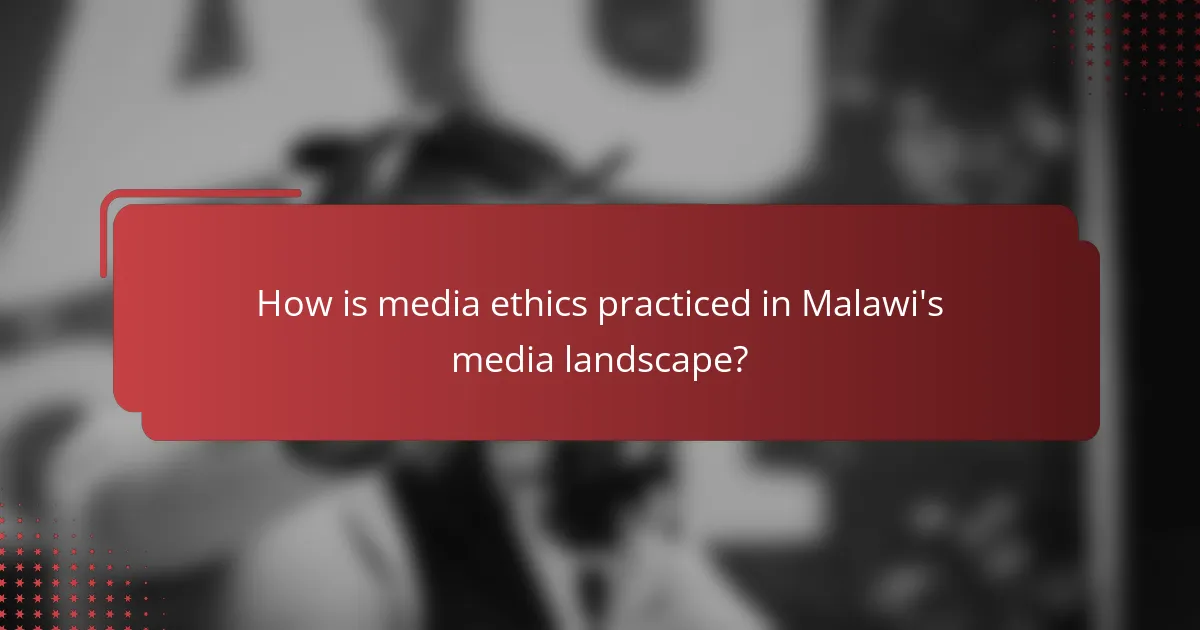
How is media ethics practiced in Malawi’s media landscape?
Media ethics in Malawi’s media landscape is practiced through adherence to established guidelines and regulations. The Malawi Communications Regulatory Authority (MACRA) sets ethical standards for media operations. Journalists are expected to follow the Malawi Journalists Association’s code of ethics. This code emphasizes accuracy, fairness, and accountability in reporting. Training programs are often conducted to enhance ethical practices among media professionals. However, challenges such as political interference and limited resources can hinder these efforts. Reports indicate that some media outlets prioritize sensationalism over ethical standards. Despite these challenges, there are ongoing initiatives aimed at strengthening media ethics in the country.
What challenges do journalists face in adhering to ethical standards?
Journalists in Malawi face significant challenges in adhering to ethical standards. Limited resources often hinder their ability to conduct thorough investigations. Political pressure can lead to biased reporting and self-censorship. Additionally, threats from powerful figures create an environment of fear. The lack of training in ethical journalism further exacerbates these issues. Many journalists operate without access to legal protections. This situation leads to a compromise in the quality of reporting. A study by the Media Institute of Southern Africa highlights these challenges in the Malawian context.
How do political pressures impact media ethics in Malawi?
Political pressures significantly impact media ethics in Malawi. Journalists often face intimidation and censorship from government officials. This pressure compromises their ability to report freely and accurately. In Malawi, the Media Council has noted increased incidents of harassment against reporters. Such actions create a climate of fear, leading to self-censorship among media professionals. Additionally, political affiliations can influence editorial decisions. Media outlets may prioritize content that aligns with government narratives to avoid backlash. This undermines journalistic integrity and public trust. Thus, political pressures distort media ethics in Malawi, affecting the quality of information available to the public.
What role does public opinion play in shaping media practices?
Public opinion significantly influences media practices by guiding content creation and editorial choices. Media outlets often adjust their reporting based on audience preferences and societal values. For instance, a study by the Pew Research Center found that 68% of journalists consider public feedback when developing stories. This responsiveness helps maintain audience trust and engagement. Furthermore, public opinion can lead to changes in media regulations and ethical standards. In Malawi, the media landscape is shaped by the need to reflect the views and concerns of the population. This dynamic ensures that media practices remain relevant and accountable to the public they serve.
What are some best practices for promoting media ethics in Malawi?
Promoting media ethics in Malawi involves several best practices. Training journalists on ethical standards is crucial. This ensures they understand their responsibilities and the impact of their work. Establishing a code of ethics for media organizations promotes accountability. Regular workshops and seminars can reinforce ethical practices among media personnel. Collaboration with international media ethics bodies can provide additional resources and guidance. Encouraging public feedback on media content fosters transparency. Implementing strict penalties for ethical violations deters misconduct. Lastly, advocating for media literacy among the public empowers individuals to critically assess media content.
How can media organizations foster an ethical culture?
Media organizations can foster an ethical culture by implementing clear ethical guidelines. These guidelines should be communicated effectively to all staff members. Regular training sessions on ethical practices can reinforce these principles. Establishing a system for reporting unethical behavior encourages accountability. Leadership must model ethical behavior to set a standard. Transparency in decision-making processes builds trust within the organization. Engaging with the community can enhance the organization’s ethical standing. Research indicates that organizations with strong ethical cultures perform better in the long term.
What training opportunities are available for journalists in Malawi?
Training opportunities for journalists in Malawi include workshops, seminars, and degree programs. Organizations like the Malawi Institute of Journalism offer diploma and degree courses in journalism. The Media Council of Malawi conducts various training sessions focused on media ethics and standards. Additionally, international organizations provide funding for training initiatives. Programs often emphasize investigative journalism, reporting skills, and ethical practices. These training opportunities aim to enhance the quality of journalism in the country. They also help journalists adhere to ethical standards in their reporting.
Media ethics in Malawi encompasses key principles such as truthfulness, accuracy, fairness, and accountability, guiding journalists in responsible reporting. The Malawi Communications Regulatory Authority and the Media Council of Malawi enforce these ethical standards, which are crucial for maintaining public trust and ensuring informed citizenry. Compliance with media ethics mitigates misinformation and promotes transparency, while challenges like political pressure and limited resources hinder adherence. The article explores the implications of these ethical guidelines, the role of regulatory bodies, and best practices for fostering an ethical culture within the media landscape in Malawi.
